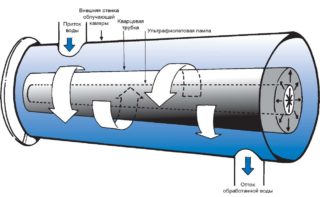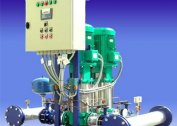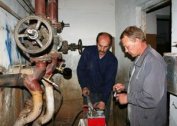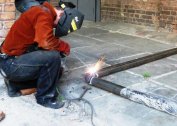Pure water is used not only in everyday life, but also in industrial processes, especially in the food, pharmaceutical, chemical and cosmetic industries. Due to the rigidity of the liquid, expensive equipment prematurely wears out, which will stop any industrial facility for a long time. To prevent this from happening, industrial filters are used for high-quality water purification.
The main types, principle of operation and device
In the production process, industrial water is used from wells and surface sources, as well as drinking water from the city water supply.
For the initial treatment, structurally simple devices are used - filters of rough mechanical water treatment. Their purpose is to "capture" solid large impurities: grains of sand, fragments of silt, and rust. Water is filtered through nets of metal with cells of different sizes or through the use of loose substances: sand, expanded clay chips, granular aluminum silicate.
Fine industrial devices are used to trap the smallest particles of organics and harmful chemical compounds. Cleaning in cartridge equipment is carried out due to coal fillers. The action of disinfecting filters is based on the cleaning effect of ultraviolet radiation. In an hour they are able to process up to 9 cubic meters of water. The advantage over chlorination is the absence of chemicals added to water.
Ultraviolet devices destroy almost all bacteria without changing the taste and color of the water.
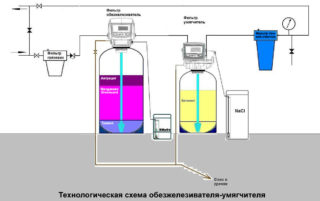 Fine filters are designed to eliminate dissolved iron or soften. The principle of their work is to expose the liquid to special reagents. Installations with a manganese medium and sand filtering material allow coping with iron fragments. Softeners use ion exchange resin. With the passage of fluid, it retains calcium and magnesium ions, which make the water hard. They are replaced by neutral sodium ions.
Fine filters are designed to eliminate dissolved iron or soften. The principle of their work is to expose the liquid to special reagents. Installations with a manganese medium and sand filtering material allow coping with iron fragments. Softeners use ion exchange resin. With the passage of fluid, it retains calcium and magnesium ions, which make the water hard. They are replaced by neutral sodium ions.
Getting rid of glandular impurities is possible without the use of reagents. Iron is oxidized by oxygen. It is pumped into the liquid using a powerful compression device. To accelerate the process, the following catalysts are used: materials based on quartz and anthracite.
Membrane devices are suitable for deep water purification. The main element of such a filtration equipment, as well as an apparatus that works by reverse osmosis technology, is a porous membrane made of synthetic materials. It captures particles larger than the pore diameter. Membrane filtering plants are needed to receive ultrapure water for medical and technical purposes, for desalination of sea water, and for the treatment of sewage.
Scope of industrial filters
In addition to the pharmaceutical, chemical, cosmetic and food industries, treatment plants are equipped with the following enterprises:
- energy and oil refining;
- paper and glass production;
- agricultural orientation.
Equipment is installed at the enterprises for the treatment of incoming water and waste liquid, which is discharged into water bodies.
For each production sector, individual water treatment complexes are selected:
| Filtration types for comprehensive cleaning | Types of Industries | ||||
| Food | Chemical, cosmetology, pharmaceutical | Pulp and paper, glass | Energy | Agricultural | |
| membrane cleansing
electrical dialysis nanofiltration ozonation ultraviolet disinfection. |
ion exchange
mechanical cleansing reverse osmosis cleaning stiffness reduction. |
ion exchange
mechanical cleansing ozonation. |
ion exchange, mechanical purification,
stiffness reduction. |
mechanical cleansing
aerobic oxidation stiffness reduction. |
|
To clean industrial sewage, they use electric dialysis, aerobic oxidation, ozonation, ion exchange and reverse osmosis cleaning.
Filtration complexes at any enterprise include biological and physico-chemical purification of liquids. For this, separate devices are installed. At large enterprises, equipment is mounted that is designed to improve the incoming liquid and treat wastewater. Huge columns of ion exchange and reverse osmosis filled with active substances are used as high-performance filtering elements.
Industrial wastewater treatment
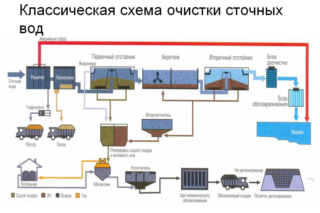 During production, a considerable amount of waste appears, including waste water. To prevent environmental pollution, they must be cleaned and poured into a nearby body of water or sent to the filtration fields for earth treatment.
During production, a considerable amount of waste appears, including waste water. To prevent environmental pollution, they must be cleaned and poured into a nearby body of water or sent to the filtration fields for earth treatment.
First of all, rough mechanical filtration is carried out. In the process of such cleaning, large debris, sand and other solid inclusions are retained.
Small solid impurities that remain in suspension are precipitated by coagulation devices.
The most difficult process is the removal of dissolved substances. They are the most dangerous for nature and human health. To get rid of them, chemical reagents are used, but bio-purification devices based on activated sludge are more often chosen. Filtered effluents are further disinfected before discharge.
Criterias of choice
When choosing equipment for water purification, one should be guided by technological maps, standards, technical conditions for certain types of technological process.
The parameters that are paid attention in the first place:
- operating mode - uninterrupted or periodic;
- temperature of suspensions and wash liquids;
- device performance and cleaning quality;
- the cost of filter elements and replacement reagents;
- the presence of additional devices, for example, a pressure gauge for adjusting the outlet pressure of the fluid flow;
- duration of service;
- the possibility of extending the operational life of industrial equipment;
- types of suspended suspensions.
Part of the filtering elements for removing iron can remove from the water and other compounds that may be necessary for production.
The cost of equipment is determined by its variety, type of medium used and productivity. Prices for industrial filters for mechanical water purification start from 10 thousand rubles. Costs for iron removal installations vary in the range of 30–80 thousand rubles. The price of coal models is approximately identical. Softeners will have to spend a little more - about 50-100 thousand. Reverse osmosis systems are most expensive. The most inexpensive reverse osmosis filter of the popular Geyser brand costs 75 thousand rubles.
The use of filtration devices increases the operational life of the equipment, allows you to save the natural environment and get products of better quality. During installation, complex calculations are required, professionals must perform them.
